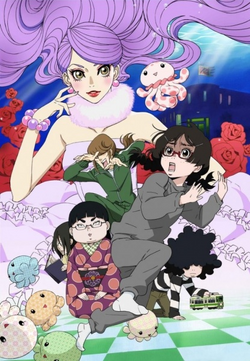No edit summary |
No edit summary Tag: sourceedit |
||
| Line 1: | Line 1: | ||
| − | [[File:Jellyfish Princess.png|thumb|250px|Jellyfish Princess is an example of Josei]]'''Josei manga''' (女性漫画 |
+ | [[File:Jellyfish Princess.png|thumb|250px|Jellyfish Princess is an example of Josei]]'''Josei manga''' (女性漫画, lit. "comics for women", also known as "ladies" (レディース redīsu) or "ladies' comics" (レディコミ redikomi, lit. "LadyComi") is a type of manga created mostly by women for late teenage and adult female audiences. Readers range from 15 to 44. In Japanese, the word josei means simply "woman", "female", "feminine", "womanhood" and has no manga-related connotations at all. |
The stories tend to be about everyday experiences of women living in Japan. Though there are some that cover high school, most cover the lives of adult women. The style also tends to be a more restrained, realistic version of shōjo manga, keeping some of the wispy features and getting rid of the very large sparkly eyes. There are exceptions in the style described above, but what defines josei is some degree of stylistic continuity of comics within this particular demographic (the same is true with different demographics that have different stylistic tendencies). |
The stories tend to be about everyday experiences of women living in Japan. Though there are some that cover high school, most cover the lives of adult women. The style also tends to be a more restrained, realistic version of shōjo manga, keeping some of the wispy features and getting rid of the very large sparkly eyes. There are exceptions in the style described above, but what defines josei is some degree of stylistic continuity of comics within this particular demographic (the same is true with different demographics that have different stylistic tendencies). |
||
Revision as of 08:20, 10 July 2017

Jellyfish Princess is an example of Josei
Josei manga (女性漫画, lit. "comics for women", also known as "ladies" (レディース redīsu) or "ladies' comics" (レディコミ redikomi, lit. "LadyComi") is a type of manga created mostly by women for late teenage and adult female audiences. Readers range from 15 to 44. In Japanese, the word josei means simply "woman", "female", "feminine", "womanhood" and has no manga-related connotations at all.
The stories tend to be about everyday experiences of women living in Japan. Though there are some that cover high school, most cover the lives of adult women. The style also tends to be a more restrained, realistic version of shōjo manga, keeping some of the wispy features and getting rid of the very large sparkly eyes. There are exceptions in the style described above, but what defines josei is some degree of stylistic continuity of comics within this particular demographic (the same is true with different demographics that have different stylistic tendencies).
Josei comics can portray realistic romance, as opposed to the mostly idealized romance of shōjo manga, but it does not always have to be. A famous example of a josei is Honey and Clover, which was animated, which is unusual for josei comics. Josei tends to be both more sexually explicit and contain more mature storytelling, although that is not always true either. It is also not unusual for themes such as infidelity and rape to occur in josei manga target specifically towards more mature audiences. Some other famously popular josei series include Yun Kouga's Loveless, Ai Yazawa Paradise Kiss, and the award-winning works of Erica Sakurazawa.
